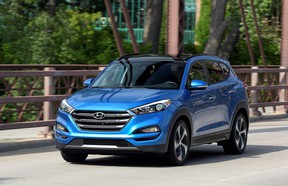Hyundai expands recall to cover almost 153,000 vehicles in Canada over engine fire risk
Worn-out bearings could lead to failures or fires, a problem Hyundai plans to correct in part via a software update that should better detect potential problems

Article content
Hyundai is expanding a prior recall to an additional 153,000 vehicles in Canada equipped with a specific family of engines, due to potential problems that could pose a fire risk or lead to the engine suddenly losing power.
Advertisement
Article content
The defect is linked to connecting rod bearings in the 2.0-litre Nu GDI engines possibly wearing out prematurely , which may damage the engine. If this problem does occur, owners may notice an “abnormal knocking noise” or see an oil pressure warning light turn on, says Transport Canada.
“If you continue to drive the vehicle with worn connecting rod bearings, the engine could fail. An engine failure would cause a sudden loss of power with an inability to restart. In some cases, a damaged connecting rod could puncture the engine block and cause an oil leak,” says TC.
Some 34,607 examples of 2017-model-year Sonata Hybrids and Tucsons with the above type engine are covered by this recall campaign. Hyundai will contact affected owners to see their dealer for an inspection; if their car’s engine bearings are worn, the engine will be replaced.
Advertisement
Article content
These vehicles are also covered by a “Product Improvement Campaign“ that expands on a former campaign Hyundai had launched previously — in fact a total 152,924 vehicles equipped with the 2.0-litre Nu are. Specifically, Hyundai will be reaching out to owners of Elantras from model years 2014 through 2016; Elantra GTs from 2014 through 2019; Tucsons from 2014 through 2019; and Sonata Hybrid and Plug-in Hybrids from 2016 through 2019 about this program.
This campaign will see affected owners visit their dealers so they may install “an update to the engine control module to detect potential problems before an engine fails,” since “an engine failure would cause a sudden loss of power with an inability to restart.”
The above-mentioned defects have dealt a gut-punch to owners of Hyundais and sibling Kia models for more than five years, impacting more than 8 million vehicles globally.


